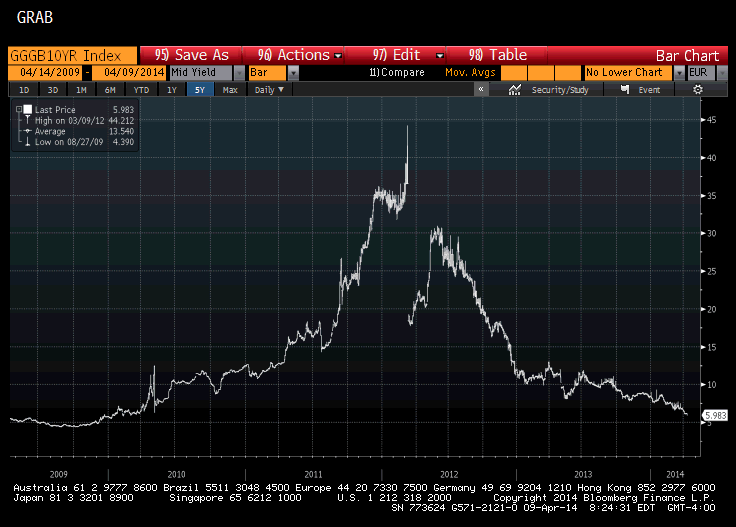
Khủng hoảng nợ công đã đẩy lợi suất trái phiếu Hy Lạp lên mức cao kinh khủng trong giai đoạn cuối 2011 đầu 2012, nhưng đến nay, mức lợi suất đó đã giảm xuống mức rất thấp, gần chạm đáy trước khủng hoảng (2009).
--------------------------------------------------
This Great Graphic, made on Bloomberg, shows the yield of Greece's 10-year bond over the past five years. The big break in early 2012 was the private sector debt restructuring. As recently as Q4 2012, the yield was near 20%.
Today it has slipped below 6%. This is less than half of the yield peak last year. Of course, the fact that it is not investment grade precludes many institutional investors from getting involved. They have preferred Spanish and Italian paper.
Although Greece has a higher percentage of debt-to-GDP now than four years ago, its yield has returned to the levels that prevailed then. In addition, tomorrow Greece is set to issue its first bond (five-year) since its international assistance program in 2010. It is hoping to raise 500 mln euros, according to reports, but indications are that it will be over-subscribed. Ironically, the ability to borrow more money from the market, that is increasing its outstanding debt may boost the government ahead of the May local and EU parliamentary elections.
There are some observers who continue to warn of a default by Greece as its primary surplus emboldens the government. However, this does not seem particularly likely to us. More likely, Greece will be rewarded by more concessions from the official sector that holds the bulk of its debt (before it returns to the capital markets) in terms of lengthening maturities and possibly reducing rates. Forbearance is not the same as a default. The legal distinctions are important.
Moreover, the official sector (which represents foreign tax payers) did not participate in the 2012 restructuring and have not lost a single penny on Greece. Indeed, we would argue some countries, like Germany, but also France, had lower yields as a result of the Greek crisis. At most one can say is that the official sector did not make as much money directly from Greece's situation as the initial terms would have suggested, but they do not appear to have lost a red cent.
Nguồn: finandlife|marctomarket.com